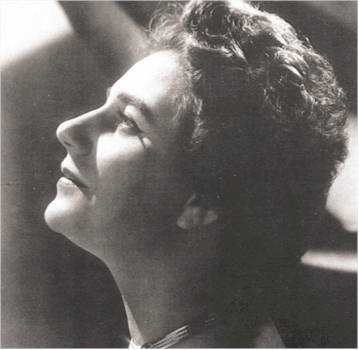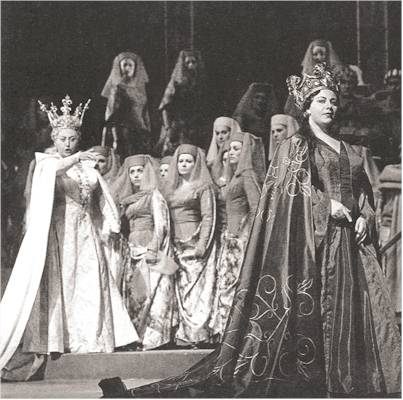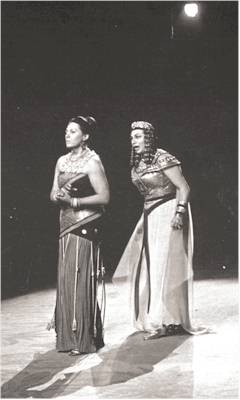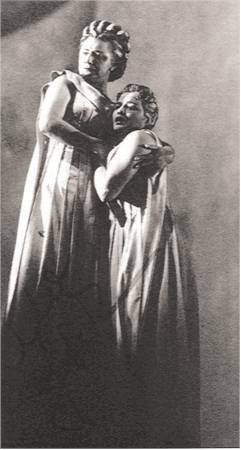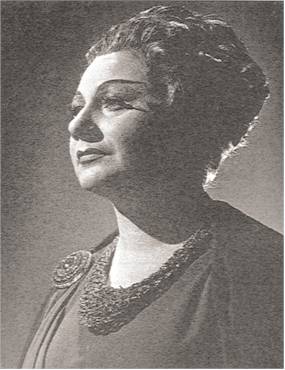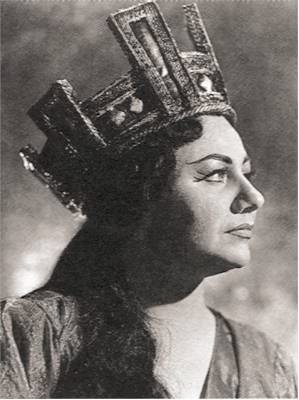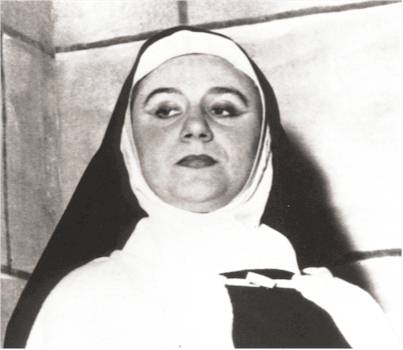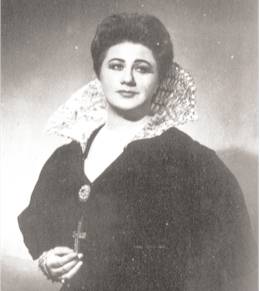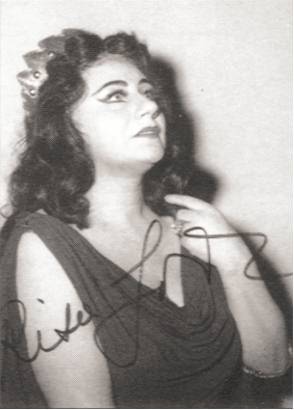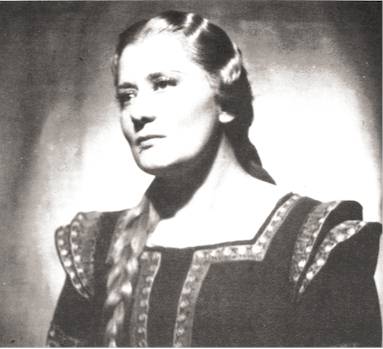Belgian mezzo-soprano, b. 1926
Biographical notes: She was born Marguerite Geirnaert in Zelzate on 18 February, 1926, studying in Ghent, then at the Brussels Conservatory with Vina Bovy and Germaine Hoerner. Gorr made her operatic debut at the Antwerp Opera as Fricka. Thereafter she was engaged at the Strasbourg Opera until 1952, also the year of her first appearances at the Opéra-Comique and the Grand Opéra. Strasbourg remained more or less her artistic home, where she sang a number of important roles such as Dalila, Orphée, Sieglinde, Fricka, Venus, Margared in Lalo’s Le Roi d’Ys, Hérodiade, La Principessa di Bouillon in Adriana Leucouvreur, and Amneris. Other roles included Azucena, Herodias, Kostelnicka in Jenufa, the Mother in Louise, Geneviève, Mme de la Haltière in Cendrillon, Santuzza, Iphigénie and Medée, among others. The artist returned to Strasbourg in 1957, as Ortrud opposite Wolfgang Windgassen. She devided her time over the next years between the Opéra and the Opéra-Comique, where she sang in Oberon, Les Indes Galantes and Rigoletto. She left the Opéra, however, feeling the roles she was offered were not true to her personality. In 1957, after several months of touring, she returned to the Opéra and repeated her Venus. Gorr explained that she felt very happy in the “big family atmosphere” and remained there until 1972, although she had to face strong competition with Hélène Bouvier, Inès Chabannes and Denise Scharley. The Opéra-Comique saw her as Brangäne and Venus throughout the 1960s and 1970s. The artist made her Bayreuth debut in 1958 as Fricka in Das Rheingold. Fricka in Die Walküre and the Third Norn in Götterdämmerung followed. Gorr found great success as Ortrud in Wieland Wagner’s production, with Elisabeth Grümmer as incomparable Elsa and Sándor Kónya as Lohengrin. Windgassen wanted her as his partner in Parsifal, but she refused. It was in Rome where she sang her first Kundry, repeating it at La Scala under Cluytens. During the 1960s and 1970s she frequently sang in Vienna, Bordeaux and Ghent. Her career at the Met included 41 performances. She was offered to sing Ariane in Barbe-Bleu, Isolde (offered by Solti) and Brünnhilde (Wolfgang Windgassen wanted her to sing the role), but she feared the high tessitura and refused. Rita Gorr, now in her 70s, is still active on stage. In the 1990s (!) she was heard as Herodias, Madame de Croissy in Les Dialogues des Carmélites, the Countess in Queen of Spades, Marthe in Faust and Filipyevna in Eugene Onegin, highly acknowledged for her imposing stage presence, not only by her devoted audience but also by today’s stage directors who love to work with this innovative artist. Rita Gorr on stage...
“Du Lästerin! Ruchlose Frau!” Régine Crespin (Elsa) and Rita Gorr (Ortrud) in Lohengrin, Covent Garden, 1963
“Son tua rivale...” Rita Gorr (Amneris) and Renata Tebaldi (Aida), Opéra de Paris, 1959
“Hilf mir, Schwester!” Elisabeth Grümmer (Freia) and Rita Gorr (Fricka) in Rheingold, Bayreuth 1958
As Fricka
As Ortrud
Mère Marie in “Les Dialogues des Carmélites” Comment:
I heard and saw Rita Gorr in the flesh at the Opéra-Comique in the early ‘80s where she appeared as Taven in Gounod’s Mireille. The role of Taven usually serves almost as an episodic
figure in the work, but Gorr made the sorceress to the central figure. Her stage presence was (and still is) truly impressive!
At the peak of her career, her huge voice was of a rich and metallic timbre. On records, however, I find her tone slightly “penetrating”. It has always been a difficult task for recording
engineers to “capture” big voices (think of Gertrude Grob-Prandl, Birgit Nilsson and Dame Eva Turner). In the famous EMI studio recording of Samson et Dalila under Prêtre her singing lacks
tenderness and sensivity which would be so essential for the role. In the excerpts from Médée and Iphigénie en Tauride there is a certain “shrillness” in the upper register. To me, the tessitura
of both roles lay simply too high (including Eboli and Kundry). I find Rita Gorr at her best in music where the score calls for a certain grandeur, for instance in
Alceste’s aria “Divinité du Styx”, or in the fury and pleading title role in Hérodiade. Here she is superb, singing with “big voice” as well as with inner emotion. Gorr’s Amneris under Solti’s baton
is also outstanding, Act 4 is a thrilling performance. Another invaluable recording is Poulenc’s Les Dialogues des Carmélites in which she performs Mère Marie, probably Gorr’s most intimate portrait on records.
As Eboli
Hérodiade Venge-moi d’une suprême offense... Ne me refuse pas with Michel Dens (EMI 1963)
Germaine Hoerner as Senta
Many thanks to Jan Neckers
|
||||||||||||||||||||||||||||||||||||||||||||||||||||||||||||||||
